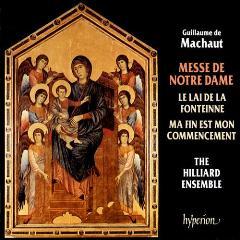Guillaume de Machaut - Messe de Notre Dame (1993)
Guillaume de Machaut - Messe de Notre Dame (1993)

1. Messe de Notre Dame: Kyrie 2. Messe de Notre Dame: Gloria 3. Messe de Notre Dame: Credo 4. Messe de Notre Dame: Sanctus And Benedictus 5. Messe de Notre Dame: Agnus Dei 6. Messe de Notre Dame: Ite Missa est 7. Le Lai de la Fonteinne: Je ne cesse de prier... 8. Le Lai de la Fonteinne: Et ou porroit on querir... 9. Le Lai de la Fonteinne: C'est celle qui par ordonnance... 10. Le Lai de la Fonteinne: Ces trois un a po de peinne.... 11. Le Lai de la Fonteinne: Et qui de ceste eaue prendroit... 12. Le Lai de la Fonteinne: Mais ceste trinite... 13. Le Lai de la Fonteinne: De la duis le Pere nomme... 14. Le Lai de la Fonteinne: Et pour ce di que cil troy... 15. Le Lai de la Fonteinne: Pour ce te pri... 16. Le Lai de la Fonteinne: Mais de tel confort... 17. Le Lai de la Fonteinne: He! fonteinne de concorde... 18. Le Lai de la Fonteinne: Pour laver et nettoier... 19. Ma fin est mon commencement: Rondeau The Hilliard Ensemble Paul Hillier – conductor
The Mediaeval Frenchman Guillaume de Machaut is one of those composers who shaped the course of musical history most significantly. He wrote some of the earliest known polyphonic pieces of vocal music, as well as writing astonishing poetry for his own semi-sacred songs or 'lais.' On this disc, the Hilliard Ensemble present three of his most representative works, all well worth exploring.
The "Messe de Nostre Dame" (not specifically written for performance in the Paris Cathedral of that name) is a stunning piece with which to open the programme. The impeccably clear-toned voices of the Hilliards etch out Machaut's austere lines with blazing intensity, revelling in the strangely dissonant cadences and dexterous interplay of parts that are the hallmarks of his polyphony. The performers use a quaint form of pronunciation for the Latin, one that (supposedly) re-creates the Mediaeval French flavour with which the listeners of seven centuries ago would have been familiar. This work alone is worth the price of the disc: it makes for rewarding and memorable listening.
The "Lai de la Fonteine" is a simpler work, yet strangely harder to grasp on first hearing. Machaut sets his own text here: a complicated and extensive hymn in praise of the Virgin Mary, using endless metaphors and subtle imagery to create an advanced form of poetry around which music is woven. The music itself is quite simple, doing seemingly little more than to carry the poetry for the listener: much of it is monophonic, with verses being shared amongst three singers who come together for polyphonic sections every so often. The work is best heard complete; much is lost in sampling it although the tracks are conveniently divided to give the listener a choice in the matter. Machaut was clearly a mysterious person - religious yet close to the secular; it shows through in such works as this 'lai.'
The disc closes with a final example of rich-blooded polyphony, again using just three voices, and moreover a sample of Machaut's extraordinary genius. "Ma fin est mon commencement" sets a poem that is crafted as a sort of palindrome (indeed, the second phrase is "et mon commencement est ma fin" - "My end is my beginning and my beginning is my end"). The music is equally well crafted to counterpart the words - three voices, winding their way through repetitive and yet fluid lines as if through some sort of musical jigsaw puzzle. It is a delightful end to a wonderful programme. If you're looking for a sample of Machaut but can only afford one disc, then this has to be the one. Mediaeval music is rarely so well displayed as it is here! ---Mark Swinton, amazon.com
download: uploaded anonfiles mega 4shared mixturecloud yandex mediafire solidfiles
Zmieniony (Wtorek, 13 Październik 2015 19:19)








